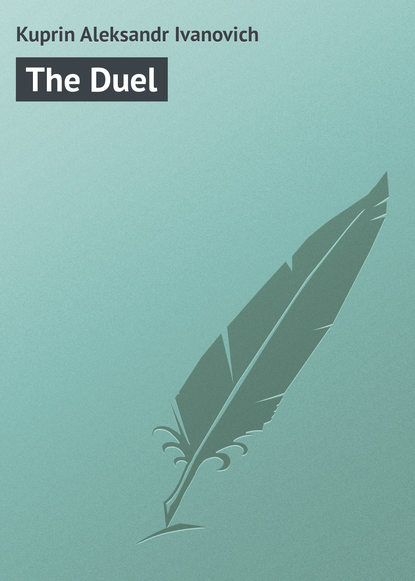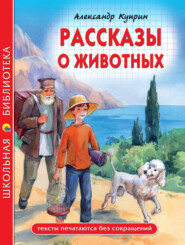По всем вопросам обращайтесь на: info@litportal.ru
(©) 2003-2024.
✖
The Duel
Настройки чтения
Размер шрифта
Высота строк
Поля
In the daytime Romashov tried to obtain a distant glimpse of Shurochka in the street, but he never succeeded. He often thought he recognized the mistress of his heart in some lady walking along. With beating heart and thrills of bliss he hurried nearer, but every time this turned out a bitter disappointment; and when he found out his mistake he felt in his soul an abandonment and deadly void that caused him pain.
XVIII
ONE day towards the end of May, a young soldier belonging to Captain Osadchi’s company hanged himself. Curiously enough, this suicide happened on the same date as a similar dreadful event in the previous year, and that, too, in Osadchi’s company.
About this time drinking-bouts were arranged in the regiment. These, in spite of their quasi-official character, were not one whit inferior in coarseness to the regular and more private gatherings inter pocula. It is highly probable that such stimulating entertainments were felt a special necessity when men, who have been tied to one another by fate, through a soul-destructive inactivity or senseless cruelty towards their kind, have chanced to look somewhat more deeply into each other’s hearts, and then – in spite of prejudices, unscrupulousness, and spiritual darkness – suddenly realize in what a bottomless pit of darkness they all are. In order to deaden the pangs of conscience and remorse at a life ruined and thrown away, all their insidious, brutish instincts have to be let loose at once and all their passions satisfied.
Shortly after the suicide in question, a similar crisis occurred among the officers. Osadchi, as might be expected, became the instigator and high-priest of the orgies. In the course of several days he organized in the mess, games of hazard more recklessly than ever, during which fearful quantities of spirit were consumed. Strangely enough, this wild beast in human form soon managed to entice pretty nearly all the officers of his regiment into a whirl of mad dissipations. And during all these carousals Osadchi, with unparalleled cynicism, insolence, and heartlessness, tried to provoke expressions of disapproval and opposition, by invoking all the powers of the nether-world to insult the name and memory of the unhappy man who had taken his own life.
It was about 6 p.m., Romashov was sitting at his window with his legs resting on the window-sill, and whistling softly a waltz out of Faust. The sparrows and magpies were making a noise and laughing at each other in the garden. It was not yet evening, but the shadows beneath the trees grew longer and fainter.
Suddenly a powerful voice was heard outside singing, not without a certain spirit, but out of tune —
“The chargers are champing, snorting, and neighing.
The foam-covered bridle still holds them in sway.”
Immediately afterwards the door was flung wide open, and Viätkin rolled into Romashov’s room with a loud peal of laughter. Although it was all he could do to stand on his legs, he kept on singing —
“Matrons and maidens with sorrowful glances
Watch till their hero is lost to their sight.”
Viätkin was still completely intoxicated from the libations of the preceding day, and his eyelids were red and swollen from a night without sleep. His hat was half off his head, and his long, waxed moustache hung down like the tusks of a walrus.
“R-romuald, Syria’s holy hermit, come, let me kiss you!” he roared in a way that echoed through the whole house. “How long do you intend to sit brooding here? Come, let us go. There’s wine and play and jolly fellows down there. Come!”
Viätkin gave Romashov a sounding kiss and rubbed his face with his wet moustache.
“Well, well, that will do, Pavel Pavlich. Is that the way to go on?” Romashov tried to defend himself against Viätkin’s repeated caresses, but in vain.
“Hold out your hand, my friend. Osadchi is kicking up a row down there, so there’s not a pane of glass unbroken. Romashevich, I love you. Come here and let me give you a real Russian kiss, right on the mouth – do you hear?”
Viätkin with his swollen face, glassy eyes, and stinking breath was unspeakably forbidding to Romashov, but, as usual, the latter could not ward off such caresses, to which he now responded by a sickly and submissive smile.
“Wait and you shall hear why I came,” shrieked Viätkin, hiccupping and stumbling about the room. “Something important, you may well believe. Bobetinski was cleaned out by me to his last copeck. Then he wanted, of course, to give an IOU. ‘Much obliged, dear boy, but that cock won’t fight. But perhaps you have something left to pledge.’ Then he drew out his revolver – here it is, by the way.” Viätkin drew from his breeches pocket, which followed, turned inside out, a choice little, well-constructed revolver protected by a chamois-leather case. “As you see, dear boy, the Mervin type. ‘Well,’ I said to him, ‘how much will you venture on that – twenty – ten – fifteen?’ And can you imagine such a curmudgeon? The first time only a rouble, on the ‘colour,’ of course. But all the same – hey, presto! slap-bang! After five raisings the revolver was mine and the cartridges too. And now you shall have it, Romashevich, as a keepsake of our old friendship. Some day you will always think of me thus: ‘Viätkin was always a brave and generous officer.’ But what are you doing? Are you writing verses?”
“Well, well, what have you brought this for, Pavel Pavlich? Put it away.”
“All right. Perhaps you think it’s no good? I could kill an elephant with it. Will experiment with it at once. Where’s that slave of yours? He shall get us a target on the spot. Wait a second. Hainán! – slave! – squire-at-arms! – hi!”
Viätkin rolled out of the door and then into Hainán’s closet, where for several minutes he was heard kicking up a row. Suddenly he returned in triumph with Pushkin’s bust under his arm.
“Well I never, Pavel Pavlich! Don’t make a fool of yourself. Let that alone.” But there was not sufficient force in Romashov’s objections, and Viätkin went on as he pleased.
“Rubbish! You chatter like a starling. Now we’ll put this on the tabouret. Stand up, you ass. I’ll teach you, by Jove!”
With these adjurations to poor Pushkin, Viätkin returned to Romashov, took his stand at the window-sill, and cocked his revolver. As he was not sober, he swung the muzzle of the weapon here and there, and Romashov expected every second that one of them would be killed.
The distance was about five paces. Viätkin was long in taking aim, during which the muzzle described some dangerous curves in the air. At last the shot rang out, and in Pushkin’s right cheek appeared a big black, irregular hole. Romashov was for some moments deafened by the report.
“Well aimed!” shrieked Viätkin, rejoicing. “Here’s your revolver, and don’t forget my friendship. Hurry on now with your uniform jacket and come with us to the mess. Long live the glorious Russian Army!”
“Pavel Pavlich, I really cannot to-day,” protested Romashov weakly. He could not defend himself. In his resistance to the other’s strenuous pressing, he neither found the proper decisive word nor the tone of voice requisite for enforcing respect, and, blaming himself inwardly for his despicable passive weakness, he wearily followed Viätkin, who with his shaky legs bravely stumbled among the cucumbers and turnips in the kitchen-garden.
The officers’ meeting that night was more than usually noisy and stormy, and finally assumed an absolutely mad character. First they caroused at mess, then drove to the railway station to drink wine, after which the orgy proceeded in the officers’ casino. Romashov held aloof at first, was angry with himself for yielding, and experienced the feeling of loathing that overcomes every sober individual in a company of drunkards. The laughter struck him as being artificial, the witticisms poor, and the singing out of tune. But the hot red wine he drank at the station mounted to his head and produced in him a noisy, nervous merriment. A curtain of millions, as it were, of grains of sand dancing round each other was spread before his eyes, which were heavy with wine, and at the same time everything seemed to him so enjoyable, comic, and humorous.
The hours flew like seconds, and it was only when the lamps of the salle-à-manger were lighted that Romashov began to realize how the time had sped and that night had set in.
“Gentlemen,” called some one, “the ladies are waiting for us. Let us be off to Schleyfer’s.”
“Hurrah! – to Schleyfer’s, to Schleyfer’s.”
The proposal was hailed with laughter and jubilation. All got up and the chairs danced along the floor. This evening everything, moreover, went off, as it were, automatically. Outside the mess-room door stood a whole row of phaetons, but nobody knew who ordered them and how they came there. Romashov was for some time tossed between moments of semi-consciousness and the fully wide-awake state and alertness of mind of a sober man. Suddenly he found himself sitting in a carriage beside Viätkin. On the front seat sat a third person whose features Romashov could not distinguish in the darkness of the night, however much he might, by violent jerks of his body sidewards, bend forward to look closely at the unknown. The latter’s face was quite dark. Now it shrunk up to the size of a man’s fist, at another time it stretched itself out awry, and then seemed to Romashov extraordinarily familiar. Romashov suddenly burst out into a roar of laughter that sounded unnatural and idiotic, and did not seem to come from himself, but from some stranger in his immediate vicinity.
“You’re lying, Viätkin. I know very well, my dear fellow, where we are going to,” babbled Romashov, in a drunken, chaffing tone. “You’re taking me to the girls, you rascal.”
At that moment a carriage passed them with a deafening noise. By the light of the lamp the outlines of a couple of brown country horses dragging quickly along in an awkward and ridiculous gallop an open carriage with a drunken coachman slashing his whip in a frantic way, and four no less intoxicated officers, were reproduced for a second.
Consciousness and the faculty of reflection returned to Romashov for a moment. Yes, it could not be disputed; he was actually on his way to a place where women surrendered their bodies to caresses and embraces for payment in cash. “Ugh! after all, it’s perhaps the same thing in the end. Women are women,” shouted a wild, brutish, impatient voice within him. At the same time, there rang in his soul a lovely, far-away, scarcely audible music – the memory of Shurochka, but in this unconscious coincidence there was nothing low, defiling, or insulting. On the contrary, the thought of her at this moment had a refreshing, soothing, and at the same time exciting and inflaming effect on his heart.
In a short time he would then find himself in close contact with that curious, mysterious, and much-vaunted species of women that he had never gazed on before. He dreamt of how he would meet their glances, take their hands, and listen to their merry laughter and joyous songs, and he felt that all this would bring him relief and consolation in his incessant longing and torturing desire for Shurochka, the only woman in the world who existed for him. In all these dreams, however, there was not a trace of degraded, sensual lust. As a dead-tired bird on the wing rushes, in the cold and darkness of an autumn night, blindly against the irresistibly attractive flood of light from the lighthouse, so, too, his soul, tortured by a cruel and capricious woman, was drawn into this sphere of undisguised, sensual tenderness and careless, boisterous merriment.
Suddenly the horses made a sharp swerve to the right, and at once the noise of the carriage and the squeaking of the wheel-tyres ceased. The carriage rocked here and there in the shallow cavities of the deep, sandy road. Romashov opened his eyes. Far beneath him and on a wide stretch of land, a multitude of small lights or lamps here and there cast their faint, uncertain glimmer. Now they disappeared behind invisible trees and houses, now they bobbed up before his eyes, and it looked as if a huge, fantastic, disordered crowd of people or a procession with torches and lanterns was moving forward down the road. An acrid smell of wormwood, a big dark branch slowly waved up and down over the heads of the parties who were being driven along, and, at the same time, they found themselves suddenly environed by a new atmosphere – cold, raw, and moist, as if it had arisen from a vault.
“Where are we?” asked Romashov.
“At Savalie,” shrieked in reply the dark figure sitting on the box-seat, in whom Romashov now recognized Lieutenant Epifanov. “We’re at Schleyfer’s, you know. Haven’t you ever been here before?”
“Go to hell,” grumbled Romashov. Epifanov kept on laughing.
“Hark you, Yuri Alexievich, shall we tell the little darlings in a whisper what an innocent you are? Later on, you’ll put all our noses out of joint.”
Again Romashov felt, half-unconsciously, that he had sunk back into impenetrable darkness, until he, as suddenly, found himself standing in a large room with parqueted floor and Vienna chairs along the walls. Over the entrance to the room, and over three other doors leading to small, dark chambers, lay hangings of red and yellow flowered cotton. Curtains of the same stuff and colour flickered in the draught from the windows opened on a gloomy backyard. Lamps were burning on the walls, but the great room was filled with smoke and the smell of meat from the adjacent kitchen; and the fumes were only dispersed occasionally by the balmy spring air entering through the window, and by the fresh scent of the white acacias that bloomed outside the house.
About ten officers took part in this excursion. All seemed bent on solving the delicate problem of contriving to shriek, laugh, and bawl at the same time. Romashov strolled about the room with a feeling of naïve, unreflecting enjoyment, and, with a certain astonishment and delight, gradually recognized all his boon-companions – Biek-Agamalov, Lbov, Viätkin, Epifanov, Artschakovski, Olisár, etc. Even Staff-Captain Lieschtschenko was discovered there. He sat huddled up in a window with his usual, eternal, resigned Weltschmerz grin. On a table stood a respectable row of bottles containing ale and a dark, thick, syrupy cherry-cordial. No one knew who had ordered all these bottles. They were thought – like so much else that night – to have come of their own accord. Romashov drank, proposed healths, and embraced every one he met, and began to feel sticky and messy about his lips and fingers.
There were five or six women in the room. One of them – a girl of fourteen dressed as a page, with rose-coloured stockings – sat on Biek-Agamalov’s knee and played with his epaulettes. Another – a big, coarse blonde in a red silk basquine and dark skirt, and with powdered face, and broad, black, painted eyebrows – went straight up to Romashov.
“Gracious, my good sir, why do you look so miserable? Come with me into that room,” she added in a whisper.
She threw herself carelessly on a table, and there sat with one leg over the other. Romashov noticed how the strong outlines of her well-formed knee were shown off by the thin skirt. A shudder thrilled him, and his hands trembled.
“What’s your name?”
“Mine? Malvina.” She turned away with an air of indifference, and began swinging her legs. “Order me a cigarette.”
Two Jewish musicians came on the scene, one with a violin, the other with a tambourine. Soon a vulgar, hackneyed, screeching polka tune was heard in the room, whereupon Olisár and Artschakovski at once began to dance the cancan. They hopped round the room first on one leg, then on the other, snapped their fingers, wagged their hips, and bent backwards and forwards with vulgar, cynical gestures. This unattractive ballet was suddenly interrupted by Biek-Agamalov, who jumped off the table, shrieking in his sharp, penetrating voice —
“To hell with the starar! Out with the ragtag and bobtail!”
XVIII
ONE day towards the end of May, a young soldier belonging to Captain Osadchi’s company hanged himself. Curiously enough, this suicide happened on the same date as a similar dreadful event in the previous year, and that, too, in Osadchi’s company.
About this time drinking-bouts were arranged in the regiment. These, in spite of their quasi-official character, were not one whit inferior in coarseness to the regular and more private gatherings inter pocula. It is highly probable that such stimulating entertainments were felt a special necessity when men, who have been tied to one another by fate, through a soul-destructive inactivity or senseless cruelty towards their kind, have chanced to look somewhat more deeply into each other’s hearts, and then – in spite of prejudices, unscrupulousness, and spiritual darkness – suddenly realize in what a bottomless pit of darkness they all are. In order to deaden the pangs of conscience and remorse at a life ruined and thrown away, all their insidious, brutish instincts have to be let loose at once and all their passions satisfied.
Shortly after the suicide in question, a similar crisis occurred among the officers. Osadchi, as might be expected, became the instigator and high-priest of the orgies. In the course of several days he organized in the mess, games of hazard more recklessly than ever, during which fearful quantities of spirit were consumed. Strangely enough, this wild beast in human form soon managed to entice pretty nearly all the officers of his regiment into a whirl of mad dissipations. And during all these carousals Osadchi, with unparalleled cynicism, insolence, and heartlessness, tried to provoke expressions of disapproval and opposition, by invoking all the powers of the nether-world to insult the name and memory of the unhappy man who had taken his own life.
It was about 6 p.m., Romashov was sitting at his window with his legs resting on the window-sill, and whistling softly a waltz out of Faust. The sparrows and magpies were making a noise and laughing at each other in the garden. It was not yet evening, but the shadows beneath the trees grew longer and fainter.
Suddenly a powerful voice was heard outside singing, not without a certain spirit, but out of tune —
“The chargers are champing, snorting, and neighing.
The foam-covered bridle still holds them in sway.”
Immediately afterwards the door was flung wide open, and Viätkin rolled into Romashov’s room with a loud peal of laughter. Although it was all he could do to stand on his legs, he kept on singing —
“Matrons and maidens with sorrowful glances
Watch till their hero is lost to their sight.”
Viätkin was still completely intoxicated from the libations of the preceding day, and his eyelids were red and swollen from a night without sleep. His hat was half off his head, and his long, waxed moustache hung down like the tusks of a walrus.
“R-romuald, Syria’s holy hermit, come, let me kiss you!” he roared in a way that echoed through the whole house. “How long do you intend to sit brooding here? Come, let us go. There’s wine and play and jolly fellows down there. Come!”
Viätkin gave Romashov a sounding kiss and rubbed his face with his wet moustache.
“Well, well, that will do, Pavel Pavlich. Is that the way to go on?” Romashov tried to defend himself against Viätkin’s repeated caresses, but in vain.
“Hold out your hand, my friend. Osadchi is kicking up a row down there, so there’s not a pane of glass unbroken. Romashevich, I love you. Come here and let me give you a real Russian kiss, right on the mouth – do you hear?”
Viätkin with his swollen face, glassy eyes, and stinking breath was unspeakably forbidding to Romashov, but, as usual, the latter could not ward off such caresses, to which he now responded by a sickly and submissive smile.
“Wait and you shall hear why I came,” shrieked Viätkin, hiccupping and stumbling about the room. “Something important, you may well believe. Bobetinski was cleaned out by me to his last copeck. Then he wanted, of course, to give an IOU. ‘Much obliged, dear boy, but that cock won’t fight. But perhaps you have something left to pledge.’ Then he drew out his revolver – here it is, by the way.” Viätkin drew from his breeches pocket, which followed, turned inside out, a choice little, well-constructed revolver protected by a chamois-leather case. “As you see, dear boy, the Mervin type. ‘Well,’ I said to him, ‘how much will you venture on that – twenty – ten – fifteen?’ And can you imagine such a curmudgeon? The first time only a rouble, on the ‘colour,’ of course. But all the same – hey, presto! slap-bang! After five raisings the revolver was mine and the cartridges too. And now you shall have it, Romashevich, as a keepsake of our old friendship. Some day you will always think of me thus: ‘Viätkin was always a brave and generous officer.’ But what are you doing? Are you writing verses?”
“Well, well, what have you brought this for, Pavel Pavlich? Put it away.”
“All right. Perhaps you think it’s no good? I could kill an elephant with it. Will experiment with it at once. Where’s that slave of yours? He shall get us a target on the spot. Wait a second. Hainán! – slave! – squire-at-arms! – hi!”
Viätkin rolled out of the door and then into Hainán’s closet, where for several minutes he was heard kicking up a row. Suddenly he returned in triumph with Pushkin’s bust under his arm.
“Well I never, Pavel Pavlich! Don’t make a fool of yourself. Let that alone.” But there was not sufficient force in Romashov’s objections, and Viätkin went on as he pleased.
“Rubbish! You chatter like a starling. Now we’ll put this on the tabouret. Stand up, you ass. I’ll teach you, by Jove!”
With these adjurations to poor Pushkin, Viätkin returned to Romashov, took his stand at the window-sill, and cocked his revolver. As he was not sober, he swung the muzzle of the weapon here and there, and Romashov expected every second that one of them would be killed.
The distance was about five paces. Viätkin was long in taking aim, during which the muzzle described some dangerous curves in the air. At last the shot rang out, and in Pushkin’s right cheek appeared a big black, irregular hole. Romashov was for some moments deafened by the report.
“Well aimed!” shrieked Viätkin, rejoicing. “Here’s your revolver, and don’t forget my friendship. Hurry on now with your uniform jacket and come with us to the mess. Long live the glorious Russian Army!”
“Pavel Pavlich, I really cannot to-day,” protested Romashov weakly. He could not defend himself. In his resistance to the other’s strenuous pressing, he neither found the proper decisive word nor the tone of voice requisite for enforcing respect, and, blaming himself inwardly for his despicable passive weakness, he wearily followed Viätkin, who with his shaky legs bravely stumbled among the cucumbers and turnips in the kitchen-garden.
The officers’ meeting that night was more than usually noisy and stormy, and finally assumed an absolutely mad character. First they caroused at mess, then drove to the railway station to drink wine, after which the orgy proceeded in the officers’ casino. Romashov held aloof at first, was angry with himself for yielding, and experienced the feeling of loathing that overcomes every sober individual in a company of drunkards. The laughter struck him as being artificial, the witticisms poor, and the singing out of tune. But the hot red wine he drank at the station mounted to his head and produced in him a noisy, nervous merriment. A curtain of millions, as it were, of grains of sand dancing round each other was spread before his eyes, which were heavy with wine, and at the same time everything seemed to him so enjoyable, comic, and humorous.
The hours flew like seconds, and it was only when the lamps of the salle-à-manger were lighted that Romashov began to realize how the time had sped and that night had set in.
“Gentlemen,” called some one, “the ladies are waiting for us. Let us be off to Schleyfer’s.”
“Hurrah! – to Schleyfer’s, to Schleyfer’s.”
The proposal was hailed with laughter and jubilation. All got up and the chairs danced along the floor. This evening everything, moreover, went off, as it were, automatically. Outside the mess-room door stood a whole row of phaetons, but nobody knew who ordered them and how they came there. Romashov was for some time tossed between moments of semi-consciousness and the fully wide-awake state and alertness of mind of a sober man. Suddenly he found himself sitting in a carriage beside Viätkin. On the front seat sat a third person whose features Romashov could not distinguish in the darkness of the night, however much he might, by violent jerks of his body sidewards, bend forward to look closely at the unknown. The latter’s face was quite dark. Now it shrunk up to the size of a man’s fist, at another time it stretched itself out awry, and then seemed to Romashov extraordinarily familiar. Romashov suddenly burst out into a roar of laughter that sounded unnatural and idiotic, and did not seem to come from himself, but from some stranger in his immediate vicinity.
“You’re lying, Viätkin. I know very well, my dear fellow, where we are going to,” babbled Romashov, in a drunken, chaffing tone. “You’re taking me to the girls, you rascal.”
At that moment a carriage passed them with a deafening noise. By the light of the lamp the outlines of a couple of brown country horses dragging quickly along in an awkward and ridiculous gallop an open carriage with a drunken coachman slashing his whip in a frantic way, and four no less intoxicated officers, were reproduced for a second.
Consciousness and the faculty of reflection returned to Romashov for a moment. Yes, it could not be disputed; he was actually on his way to a place where women surrendered their bodies to caresses and embraces for payment in cash. “Ugh! after all, it’s perhaps the same thing in the end. Women are women,” shouted a wild, brutish, impatient voice within him. At the same time, there rang in his soul a lovely, far-away, scarcely audible music – the memory of Shurochka, but in this unconscious coincidence there was nothing low, defiling, or insulting. On the contrary, the thought of her at this moment had a refreshing, soothing, and at the same time exciting and inflaming effect on his heart.
In a short time he would then find himself in close contact with that curious, mysterious, and much-vaunted species of women that he had never gazed on before. He dreamt of how he would meet their glances, take their hands, and listen to their merry laughter and joyous songs, and he felt that all this would bring him relief and consolation in his incessant longing and torturing desire for Shurochka, the only woman in the world who existed for him. In all these dreams, however, there was not a trace of degraded, sensual lust. As a dead-tired bird on the wing rushes, in the cold and darkness of an autumn night, blindly against the irresistibly attractive flood of light from the lighthouse, so, too, his soul, tortured by a cruel and capricious woman, was drawn into this sphere of undisguised, sensual tenderness and careless, boisterous merriment.
Suddenly the horses made a sharp swerve to the right, and at once the noise of the carriage and the squeaking of the wheel-tyres ceased. The carriage rocked here and there in the shallow cavities of the deep, sandy road. Romashov opened his eyes. Far beneath him and on a wide stretch of land, a multitude of small lights or lamps here and there cast their faint, uncertain glimmer. Now they disappeared behind invisible trees and houses, now they bobbed up before his eyes, and it looked as if a huge, fantastic, disordered crowd of people or a procession with torches and lanterns was moving forward down the road. An acrid smell of wormwood, a big dark branch slowly waved up and down over the heads of the parties who were being driven along, and, at the same time, they found themselves suddenly environed by a new atmosphere – cold, raw, and moist, as if it had arisen from a vault.
“Where are we?” asked Romashov.
“At Savalie,” shrieked in reply the dark figure sitting on the box-seat, in whom Romashov now recognized Lieutenant Epifanov. “We’re at Schleyfer’s, you know. Haven’t you ever been here before?”
“Go to hell,” grumbled Romashov. Epifanov kept on laughing.
“Hark you, Yuri Alexievich, shall we tell the little darlings in a whisper what an innocent you are? Later on, you’ll put all our noses out of joint.”
Again Romashov felt, half-unconsciously, that he had sunk back into impenetrable darkness, until he, as suddenly, found himself standing in a large room with parqueted floor and Vienna chairs along the walls. Over the entrance to the room, and over three other doors leading to small, dark chambers, lay hangings of red and yellow flowered cotton. Curtains of the same stuff and colour flickered in the draught from the windows opened on a gloomy backyard. Lamps were burning on the walls, but the great room was filled with smoke and the smell of meat from the adjacent kitchen; and the fumes were only dispersed occasionally by the balmy spring air entering through the window, and by the fresh scent of the white acacias that bloomed outside the house.
About ten officers took part in this excursion. All seemed bent on solving the delicate problem of contriving to shriek, laugh, and bawl at the same time. Romashov strolled about the room with a feeling of naïve, unreflecting enjoyment, and, with a certain astonishment and delight, gradually recognized all his boon-companions – Biek-Agamalov, Lbov, Viätkin, Epifanov, Artschakovski, Olisár, etc. Even Staff-Captain Lieschtschenko was discovered there. He sat huddled up in a window with his usual, eternal, resigned Weltschmerz grin. On a table stood a respectable row of bottles containing ale and a dark, thick, syrupy cherry-cordial. No one knew who had ordered all these bottles. They were thought – like so much else that night – to have come of their own accord. Romashov drank, proposed healths, and embraced every one he met, and began to feel sticky and messy about his lips and fingers.
There were five or six women in the room. One of them – a girl of fourteen dressed as a page, with rose-coloured stockings – sat on Biek-Agamalov’s knee and played with his epaulettes. Another – a big, coarse blonde in a red silk basquine and dark skirt, and with powdered face, and broad, black, painted eyebrows – went straight up to Romashov.
“Gracious, my good sir, why do you look so miserable? Come with me into that room,” she added in a whisper.
She threw herself carelessly on a table, and there sat with one leg over the other. Romashov noticed how the strong outlines of her well-formed knee were shown off by the thin skirt. A shudder thrilled him, and his hands trembled.
“What’s your name?”
“Mine? Malvina.” She turned away with an air of indifference, and began swinging her legs. “Order me a cigarette.”
Two Jewish musicians came on the scene, one with a violin, the other with a tambourine. Soon a vulgar, hackneyed, screeching polka tune was heard in the room, whereupon Olisár and Artschakovski at once began to dance the cancan. They hopped round the room first on one leg, then on the other, snapped their fingers, wagged their hips, and bent backwards and forwards with vulgar, cynical gestures. This unattractive ballet was suddenly interrupted by Biek-Agamalov, who jumped off the table, shrieking in his sharp, penetrating voice —
“To hell with the starar! Out with the ragtag and bobtail!”

















